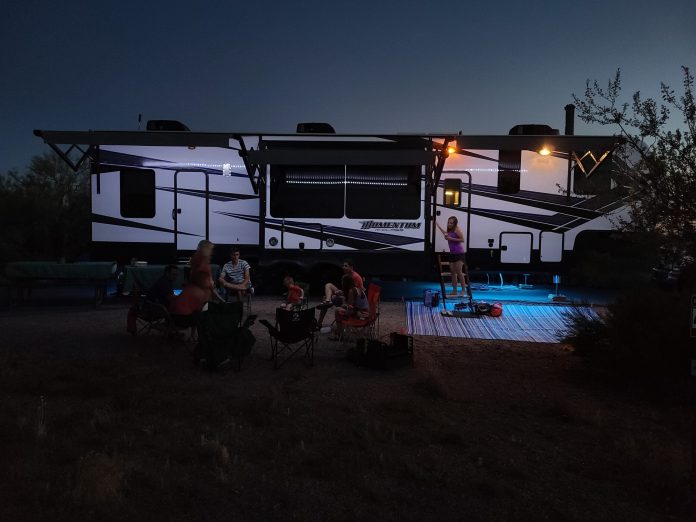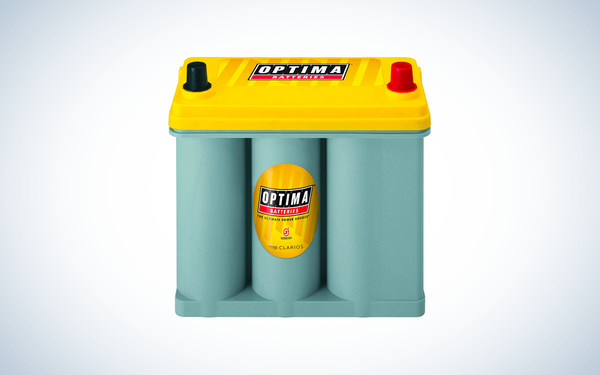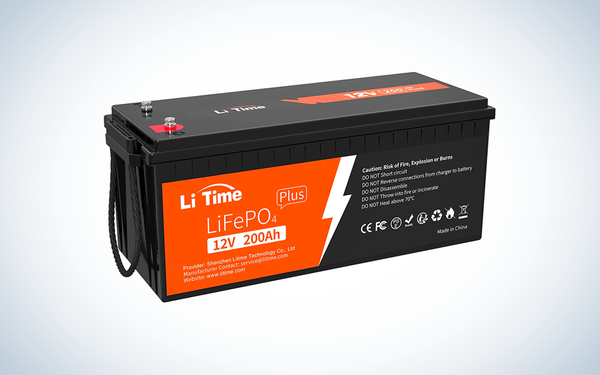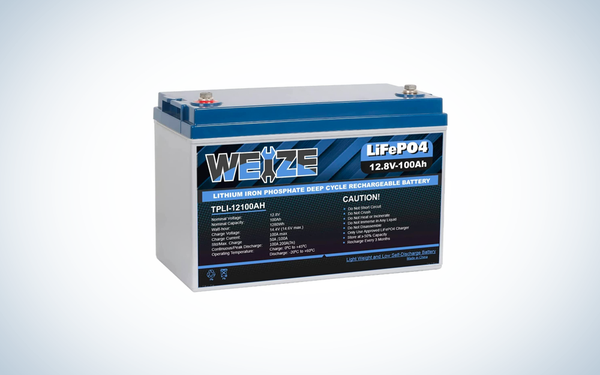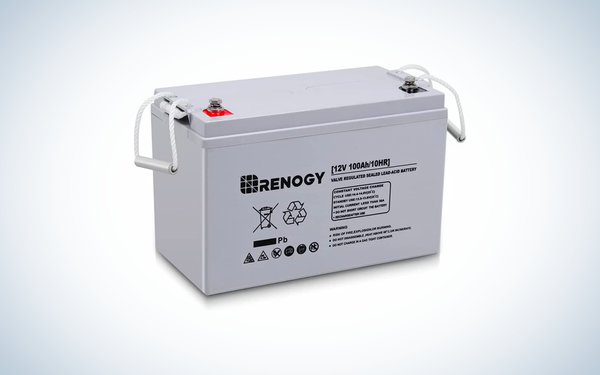We may earn revenue from the products available on this page and participate in affiliate programs. Learn more ›
Published May 22, 2023 10:27 AM
Good RV batteries are critical to a successful RV camping experience. Similar to how a bad battery can wreck a fishing trip on your boat, a dead battery can ruin a camping trip in a hurry. In fact, many anglers will use one battery for the motor and one for running the electrons. These two types of batteries are not the same, and it is important to understand the difference. The same goes for RV batteries and car batteries—they aren’t the same, and it’s crucial to know what battery to buy for your rig.
There are four main types of RV batteries; wet cell lead acid, gel cell lead acid, absorbent gas mat (AGM) lead acid, and Lithium-ion (Li-ion). These four types of batteries also follow the same order for both performance and cost, with Li-ion batteries being the best-performing and most expensive. Your RV likely came from the factory with one of the first three types as the standard option; however, some of the higher-end RVs come with a Li-ion from the start. But before you head out on your next adventure, check your electrical systems, and if need be, replace your power source with one of the best RV batteries available.
How We Picked the Best RV Batteries
I have over 30 years of experience with RV batteries in all different capacities. I’ve used and tested different types, styles, brands, and more to help power my own RV and other off-roading vehicles. My experience even goes further back if you take into account the years of using automotive and marine batteries. I’ve also used every type of RV, from pop-up campers to travel trailers to large motorhomes, and one thing is always the same—you have to have a quality battery for the electrical systems, or the trip is ruined. Here are a few things I look for in a good RV battery:
- Durability: How long will the battery last, and how much use can it withstand while still performing?
- Power output: How much power does the battery put out, and is it strong enough to power everything you need in an RV?
- Rechargability: How well does the battery hold a charge, and how long does it take to recharge?
Best RV Batteries: Reviews & Recommendations
Best Overall: Optima Yellow Top AGM
Specs
- Type: AGM battery
- Power: 12 volt
- Amps: 450 (D51 model)
- Weight: 26 pounds
Pros
- Sealed, maintenance-free battery
- Fast recharge rates
- Over 300 recharges
Cons
- Higher cost
- Works best with a battery tender
The Optima Yellow Top is a premium battery that will last for a long time and can provide power to run your RV’s motor and accessories. It can also handle repeated recharges without wearing out. The Yellow Top is excellent for starting an RV, and there are multiple sizes available to exactly fit your battery opening, as well as provide the required amps for your RV needs. The Optima line features a SpiralCell structure which gives the battery a low discharge rate while at the same time making it resistant to damage from vibration. This is why you often see off-roaders and boat owners both using Optima batteries—they can handle a lot of abuse. And Yellow Top batteries can take well over 300 recharge cycles down to a 50-percent discharge. It is recommended to use a battery tender with Optima batteries, as they will recharge fast, but repeated deep drains, and leaving them to sit for long periods of inactivity can decrease their lifespan.
Best Solar Battery: LiTime 12V 200Ah PLUS Lithium LiFePO4 Battery
Specs
- Type: Li-ion Battery
- Power: 12.8-volts (can be used in series, too)
- Weight: 48.3 pounds
Pros
- Long life
- 10 year warranty
- Low discharge rate
- Durable
- Nontoxic
Cons
This large-sized Lithium-ion battery has great power, a long lifespan, and a low discharge rate. Which makes it one of the best choices for off-the-grid use. In fact, it is perfect for those using a solar RV battery system for recharging, especially if you’re going to park your RV somewhere for a lengthy stay. These types of batteries are great RV replacement batteries, too. This battery is built for durability and has built-in protection from overcharges. It can withstand over 4,000 recharge cycles and has a very low self-draw, meaning it can sit for a long period of time and not lose much juice. Being a Li-ion battery, this one has three times the energy density of a similar-sized lead battery at a fraction of the weight. Want more convincing? How does a 10-year warranty sound? If you are looking for a long-term battery solution, this is our pick.
Best Premium Battery: WEIZE 12V 100Ah LiFePO4 Lithium Battery
Specs
- Type: Lithium Ion Battery
- Power: 12 volts
- Weight: 26.4 pounds
Pros
- Long life
- Fast recharge
- Lightweight
- 10-year warranty
Cons
- Higher initial cost
- Requires Li-ion charger
You’re looking at the best 100Ah capacity battery on the market, and it comes full of many great features. For starters, it has a built-in Battery Management System (BMS) that protects the battery from overcharge, excessive discharge, over-current, short-circuiting, and high and low temperature issues. This gives the Weize a lifespan that lasts well over 8,000 cycles at 50 percent discharge. You can run it in series with up to 4 Li-ion batteries, too. Weize suggests you only charge it with a dedicated Li-ion battery charger, which is a good idea for any Li-ion battery. However, it does include solar charging, which makes this a great battery for off-grid living. If the 100Ah capacity wasn’t enough, Weize also makes a 300Ah model.
Best Innovative Design Battery: Renogy Deep Cycle AGM Battery w/ Battery Monitor
Specs
- Type: AGM battery
- Power: 12 volts
- Discharge rate: 3%
Pros
- Long-lasting AGM battery
- Rugged and leakproof
- Low discharge rate
- Optional battery monitor works with every battery
Cons
Renogy makes some pretty outstanding batteries and battery accessories, and this model packaged with their battery monitor is a pretty innovative design. The battery itself is a 12-volt AGM battery with a low three-percent self-discharge rate that comes thanks to their proprietary alloy formula. This means that the battery will hold a charge for a long period of time. It is also a great option for dual battery setups. Unlike many other models, this unit comes with a digital battery monitor that gives you complete data on the battery’s performance. This is extremely helpful for extended stays when you need to know exactly how much battery life you have left. The monitor gives you the percentage as well as the discharge rate and more. Plus, it works with any battery, not just the Renogy. The battery also comes with a two-year warranty.
Fastest Charging: Tracker Lithium Gen2
Specs
- Type: Lithium-ion
- Weight: 21 pounds
- Amp hours: 80
Pros
- Faster recharge time
- Long life
- 5 year warranty
Cons
Marine batteries are made to be extremely durable and handle the roughest conditions. And while they might not be the best option for your truck, they do tend to work pretty well in RVs. The Tracker Lithium Gen 2 made our list of best marine batteries, and it makes this list, too, for many of the same reasons. Produced by RelION technology, this battery takes on more than 5,000 discharges with a capacity of 80-amp hours. After being run down, the Tracker battery powers back up in as little as an hour and a half. Tracker also boasts internal fire protection. Something that can give some added peace of mind. And Tracker even offers a 5 year warranty for this battery.
Things to Consider Before Buying an RV Battery
An RV battery is actually quite different from your regular automotive battery, mostly due to one major thing—your RV has more stuff and cool camping gadgets for the battery to power. If you’re in a campground with an electrical hook-up, that is one thing. But when you’re not plugged in, the RV has to operate on battery power alone. This is one of the reasons why Li-ion type batteries and solar generators are becoming increasingly popular with RV owners. Large capacity RV batteries are often getting the nod over dual battery setups for those looking at a replacement battery.
What should you look for? Amp hour ratings are important. This is the capacity of the battery. The more capacity you have, the longer you can go between recharges, so if you’re looking for a battery for a solar generator system, or off-grid RV camping, get a bigger battery around the 300Ah range. You’ll be much happier.
The lifespan of an RV battery is important too. You want one that can take a lot of recharges over the course of ownership. You’ve already invested so much in your camper, and you don’t want to have to replace expensive batteries all the time, too. It is a better long-term investment to buy a premium battery once than to buy three cheaper ones that will wind up costing more.
Maintenance isn’t as much of an issue with Lithium batteries, or even closed-cell batteries, as it was with the older lead-acid batteries that you have to check all the time. Still, proper maintenance is required for everything, and a battery tender, also known as a trickle charger, is a great idea for your RV. This is especially true when you consider the price of the batteries. An expensive battery system should simply be maintained for the best performance. And speaking of cost, you should take that into account, too. If you only have a limited budget for a new battery, make sure you take care of it to the best of your ability to protect that investment.
FAQs
Q: How long do my RV batteries last on average?
This depends on how often you use it. If you’re using a lot of juice, the battery will drain fast. You also need to look at the overall capacity and the age of the battery. The older a battery gets, the closer it is to dying. Even the best RV batteries will eventually wear out. Keep them charged and use a trickle charger and proper storage when not in use to help increase their lifespan.
Q: How do I maintain my RV batteries?
Maintaining your RV batteries is simple. First, keep it charged while in use. When you’re not using it, like during the winter months, take the battery out and store it in an even-temperature place, like your basement. Keep it off concrete or the ground, and use a battery tender or trickle charger. When in your camper, make sure it is secured in place, and check it as often as you can to make sure the connections are tight.
Q: How long does it take to charge an RV battery fully?
It depends on the type of battery you’re using. Traditional lead-acid batteries take longer to charge than AGM batteries, which take longer to charge on average than a Lithium battery. It is important not to overcharge a battery by dumping in too strong of a current. This can harm the battery and also be dangerous.
Q: Are marine & RV batteries basically the same or do they differ?
While they are not the same, most marine batteries can be used as RV batteries. Be sure it is a deep cycle battery so it can be recharged often. The biggest difference between the two is intended use. Marine batteries are built for the abuse of boating on rough water, and this includes corrosive environments like saltwater. On the flip side, RV batteries do not make very good marine batteries because they aren’t designed with that durability in mind.
Q: How do I know my RV battery is dead?
Aside from the obvious of things not working, the best way to know if your RV battery is dead is to try to charge it. It may have been drawn down too much to keep things operating. If it doesn’t take a charge, then have it tested to see if it has outlived its usefulness. Much like a car battery, RV batteries only last for so long.
Q: What is the best way to charge my RV battery?
You can use the engine’s alternator if you have a motorhome. It will be just like your car battery and will slowly recharge and maintain it like your car or truck. If you have a separate battery system in your RV, a slow charge will always be the best option. Consult your exact battery model’s recommendations for proper charging. Nowadays, many battery chargers allow you to select the type of battery and optimal recharge rate for increased lifespan.
Best RV Batteries: Final Thoughts
The Optima Yellow Top won the best overall award due to its incredible performance in my RV, truck, boat, and even UTV. It checks all the boxes. With solar power becoming a major part of RV batteries these days, being able to work seamlessly with solar generators, power sources, and chargers are a big part of what makes a great RV battery, too. While some selections on this list are better than others when paired with a solar system, every recommendation will meld with your RVs solar power, too.
Why Trust Us
For more than 125 years, Field & Stream has been providing readers with honest and authentic coverage of outdoor gear. Our writers and editors eat, sleep, and breathe the outdoors, and that passion comes through in our product reviews. You can count on F&S to keep you up to date on the best new gear. And when we write about a product—whether it’s a bass lure or a backpack—we cover the good and the bad, so you know exactly what to expect before you decide to make a purchase.

